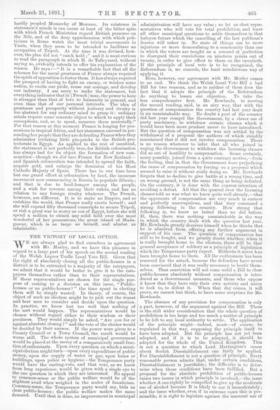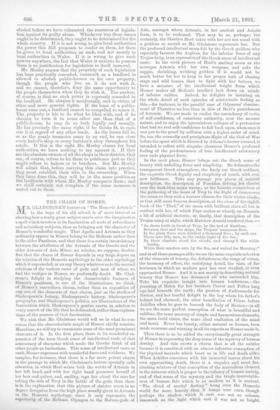THE VICTORY OF LOCAL OPTION.
WE are always glad to find ourselves in agreement with Mr. Morley, and we have this pleasure in regard to a large part of his speech on the second reading of the Welsh Liquor Traffic Local Veto Bill. Given that the right of absolutely closing all the public-houses in a district is to be entrusted to a majority of the ratepayers, we admit that it would be better to give it to the rate- payers themselves rather than to their representatives. If those representatives are chosen for the single pur- pose of coming to a decision on this issue, "Public- houses or no public-houses ? " the time spent in electing them will be simply wasted. In theory, of course, the object of such an election might be to pick out the wisest and best men to consider and decide upon the question. In practice, we know but too well that nothing of the sort would happen. The representatives would be chosen without regard either to their wisdom or their goodness. They would simply be asked, " Are you for or against absolute closing ?" and the vote of the elector would be decided by their answer. If the power were given to a County Council or a Town Council, the result would be worse still. The whole system of municipal government would be placed at the mercy of a comparatively small frac- tion of enthusiasts. Upon every question on which a muni- cipal election might turn—upon every expenditure of public money, upon the supply of water or gas, upon loans or buildings, upou police or hygiene—the Temperance party would have the casting-vote, and that vote, as we know from long experience, would be given with a single eye to the one question in which they are interested. No appeal to common-sense or the public welfare would be of the slightest avail when weighed in the scales of fanaticism. Common-sense, the Temperance party would say, bids us close public-houses ; the public welfare makes the same demand, Until that is done, no improvement in municipal administration will have any value ; so let us elect repre- sentatives who will vote for total prohibition, and leave all other municipal questions to settle themselves in that halcyon future which the cancelling of the last publican's licence will usher in. No state of things can be more injurious or more demoralising to a community than one in which the voters are taught as a counsel of perfection to disregard their convictions on nineteen points out of twenty, in order to give effect to them on the twentieth. If the principle of local veto is to be recognised, the Referendum is, we concede, the least mischievous way of applying it. Here, however, our agreement with Mr. Morley comes to an end. We think the Welsh Local Veto Bill a bad Bill for two reasons, and as to neither of them does the fact that it adopts the principle of the Referendum do anything to lessen our objection. To take the less comprehensive first. Mr. Rowla,nds, in moving the second reading, said, in an airy way, that with the question of compensation the country had last year dealt in an unmistakable way. No doubt a part of the country did last year compel the Government, by a clever use of party machinery, to withdraw certain clauses which it would have been more prudent never to have introduced. But the question of compensation was not settled by the withdrawal of a proposal the authors of which steadily maintained that it did not involve compensation. There is no reason whatever to infer that all who joined in urging the Government to withdraw the licensing clauses did so out of hostility to compensation. Some certainly, many possibly, joined from a quite contrary motive,—from the feeling, that is, that the Government were prejudicing the cause of compensation by forcing on a proposal which seemed to raise it without really doing so. Mr. Rowlands forgets that to decline to give battle at a wrong time, ani on wrong ground, is not the same thing as being defeated, On the contrary, it is done with the express intention of avoiding a defeat. All that the quarrel over the licensing clauses told us was what we knew quite well already,—that the opponents of compensation are very much in earnest and perfectly unscrupulous, and that they command a strong following in the country. How strong that following is, we know no better than we did before. If, then, there was nothing unmistakable in the way in which the country dealt with the question last year, Mr. Rowlands greatly deceives himself when he thinks that he is absolveet from offering any further argument in support of his case. The question of compensation has still to be fought, and we greatly doubt whether, when it is really brought home to the electors, there will be that general acceptance of robbery as a principle of legislation which the Temperance party expect. Hitherto it never has been brought home to them. All the enthusiasm has been reserved for the attack, because the defenders have never been convinced that it was really necessary to bestir them- selves. That conviction will not come until a Bill to close public-houses absolutely without compensation is intro- duced as a Government measure, and those who oppose it know that they have only their own activity and union to look to, to defeat it. When that day comes, it will prove, we cannot but think, to have some surprises for Mr. Rowlands.
The absence of any provision for compensation is only a part, however, of the argument against the Bill. There is the still wider consideration that the whole question of prohibition is too large and too much a matter of principle to be left to any local authority to settle. The application of the principle might—indeed, must—of course, he regulated in this way, supposing the principle itself to have been adopted. But the principle has not yet been adopted, and if it is to be adopted, it should be adopted for the whole of the United Kingdom. This is not a question to which Lord Hartington's canon about Scotch Disestablishment can fairly be applied. For Disestahlishment is not a question of principle. Every reasonable person admits that, under. certain. conditions, Disestablishment is justifiable ; the difficulty is to deter- mine when those conditions have been fulfilled. But a proposal for the absolute prohibition of public-houses raises two issues in which principle is involved,—the issue whether A can rightly be compelled to give up the moderate use of alcohol because B is likely to use it immoderately ; and the issue whether, even if in extreme cases this is per- missible, it is right to legislate against the innocent use of aleohol before we have exhausted the resources of legisla- tion against its guilty abuse. Whichever way these issues ought to be determined, they ought to be determined for the whole country. If it is not wrong to give local authorities the power this Bill proposes to confer on them, let them bo given to local authorities as such, and not merely to local authorities in Wales. If it is wrong to give such powers anywhere, the fact tha,i, Wales is anxious to possess them is no justification for legislation in itself immoral. Mr. ,Morley argues that the propriety of such legislation has been practically conceded, inasmuch as a landlord is allowed to abolish public-houses on his own property, though the . people who live on it do not wish it, and we cannot, therefore, deny the same opportunity to the people themselves when they do wish it. The answer, of course, is that no such , power is expressly conceded to the landlord. He obtains it accidentally, and in virtue of other and more general rights. If the lease of a public- house runs out, a landlord cannot be compelled to renew it. The property is his to do what he likes with, and if he chooses to turn it to some other use than that of a public-house, he may do so both legally and morally. Ho has precisely the same right, if he thinks fit, to exer- cise it in regard of any other trade. As the leases fall in, or as the yearly tenancies come to an end, he can close every baker's shop or every butcher's shop throughout his estate. If this is the right Mr. Morley claims for local authorities, we have nothing to say against it. If they are the absolute owners of all the shops in their district, they can, of course, refuse to let them to publicans just as they might refuse to bakers or to butchers. But Mr. Morley will admit that, before carrying this claim into practice, they must establish their title to the ownership. When they have done this, they will be in the same position as the landlords with whom Mr. Morley compares them ; and we shall certainly not complain if the same measure is meted out to them.



































 Previous page
Previous page